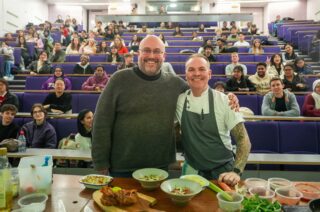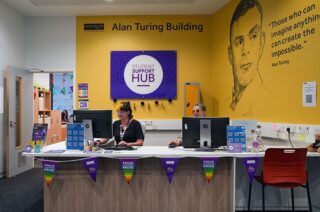Meet FSE’s Students’ Union Officer Nahid Farzalizadeh

Nahid Farzalizadeh serves as the Students’ Union Officer for the Faculty of Science and Engineering. Appointed after completing her postgraduate degree in Chemical Engineering, Nahid shares her experiences in the role so far and her ambitions for what she hopes to accomplish during her term.
Can you tell me more about your role?
I think that my role is one of the most unique experiences you could have as a graduate. Every day is different. There’s such a variety of activities from professional meetings one day, where you’re collaborating with key stakeholders or working on a project, to running an event or engaging directly with students. Over the course of a year, you gain so much hands-on experience that I don’t think you can easily get anywhere else in such a short time. It’s a steep learning curve, but it’s incredibly rewarding and sets you up with a strong foundation.
What are your priorities?
My priorities focus on both shared and individual goals within my role. Employability is a key shared priority with the other Faculty Education Officers and is also my top individual priority. Another shared focus is assessment and feedback, which is crucial to improving the student experience.
Individually, I’m also working on improving study spaces and library access for PGT students, especially during the summer. This stems from a survey I conducted while writing my own dissertation, which highlighted a lack of 24/7 study spaces during a critical period. Facilities like the Alan Gilbert Learning Commons were closed for maintenance and the Main Library had limited hours, which affected both PGTs and students resitting exams. I’ve had an initial discussion with the University Librarian and now have the data ready to share with them. It’s all about addressing real student challenges and creating practical solutions.
Another area I’m focusing on is closing the feedback loop. Often, decisions are made and actions are planned, but students aren’t always informed about the outcomes. I believe it’s important to share both short-term updates and long-term progress so students feel their feedback is heard and impactful.
Can you tell me more about some of the meetings you attend?
I actively participate in a diverse range of meetings, from the University Senior Leadership Team and the Teaching, Learning, and Student Experience Group (TLSG) to the Faculty Teaching, Learning, and Student Committee (FTLSEC). These are critical spaces where the student voice is genuinely valued. Attendees at the FTLSECs are keen to understand student perspectives on proposed decisions, and these meetings also provide a platform for me to present ideas and seek support for initiatives that I can’t implement alone.
On the student side, we participate in several key meetings. One of the most significant for the Faculty is the Faculty Forum, which we host twice a year, with the most recent taking place in November. Around 40-45 students attended, and it was a great opportunity to engage directly with our students. Peter Green, Jo Cartwright and other members of staff from FSE attended and Jo shared updates on NSS actions, which was valuable for students to hear. While the turnout was good, I’d love to see even broader student representation in these forums to make the discussions even richer.
You recently attended the Annual Performance Review, can you tell me more about that?
Each Faculty has an Annual Performance Review (APR), and SU officers are part of the review panel alongside the President and Vice-Chancellor and other senior leaders from the University. We receive a detailed data pack about two weeks beforehand, allowing us to review the Faculty’s performance and identify areas for improvement.
I regularly meet with Peter Green, so he was already aware of the concerns I raised during the review, as we’d been discussing them for a couple of months leading up to the APR. This meant we were well-prepared for the discussion. The APR is one of the most important meetings I’ve attended, as it’s a key opportunity to contribute to strategic planning and ensure that the student voice is represented at the highest level.
Finally, what would you have liked to have achieved by the end of your term?
One year is of course a short time to achieve everything, but I hope to make significant progress on some of my priorities and set a strong foundation for the next officer to build on, just as Raheel did for me. Change often takes time in terms of getting agreement, piloting projects, and ensuring consistency, but I’m focused on achieving tangible results within the time I have. For instance, addressing study spaces for PGT students is entirely feasible, as there are already processes in place to enable 24/7 access to the AGLC. The key is aligning these resources with the specific needs of PGT students and managing the logistics to ensure it works effectively for them.
In relation to the priority around employability, I’m eager to collaborate closely with employability leads in each Discipline and strengthen connections between them, academic societies, and the careers service. At the moment, these groups often work separately on similar initiatives, such as industry events or trips. By fostering stronger collaboration, we can streamline efforts and provide students with more cohesive and impactful opportunities.
If I can make progress on these, I’ll feel I’ve contributed meaningfully and left a strong platform for the next officer to continue.


